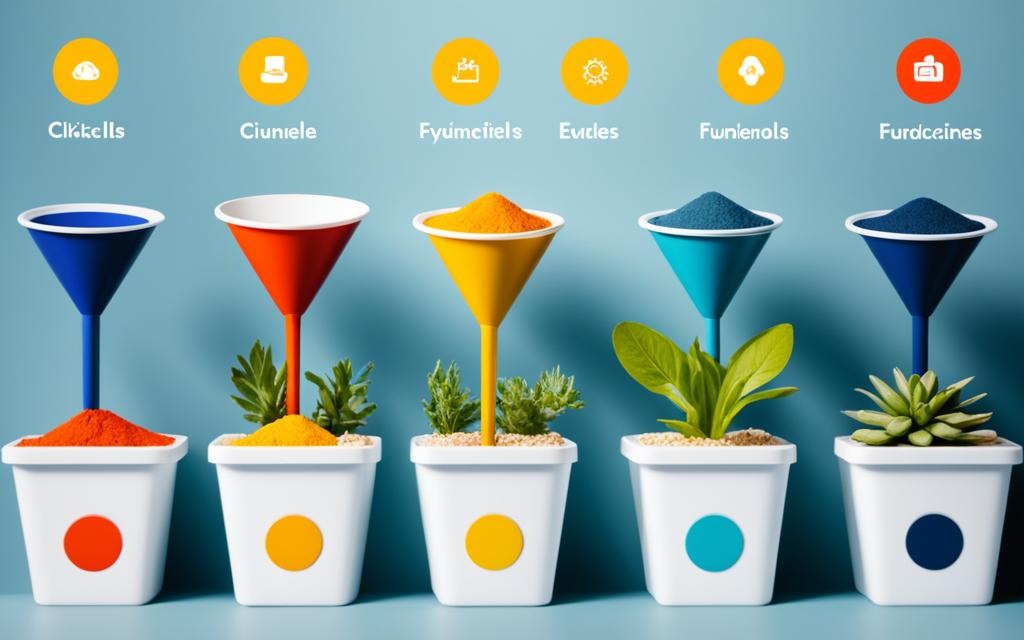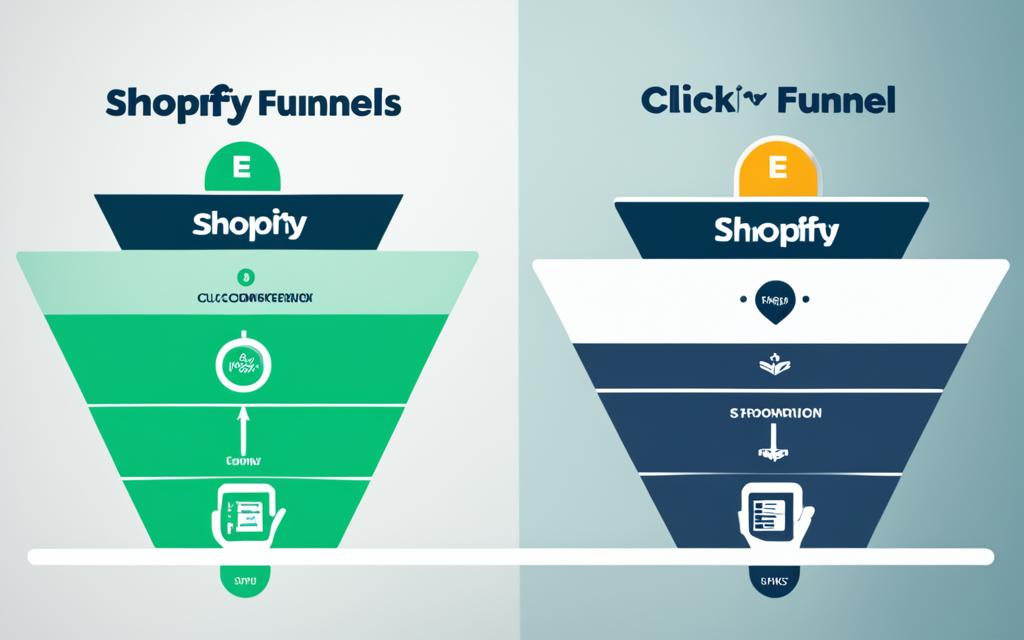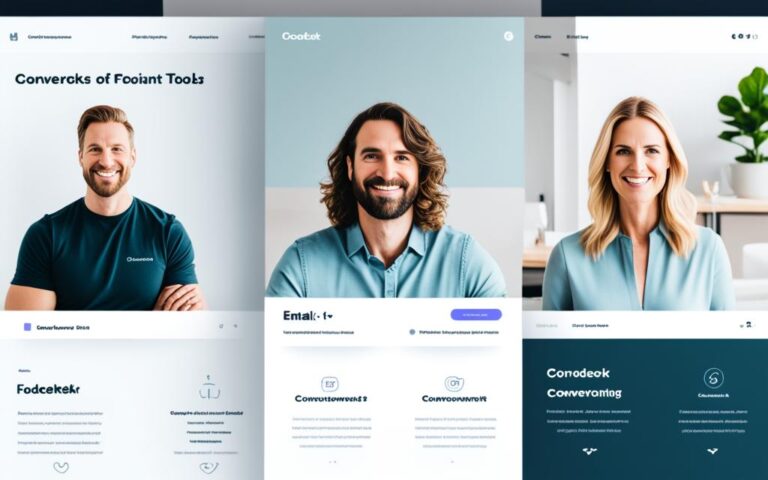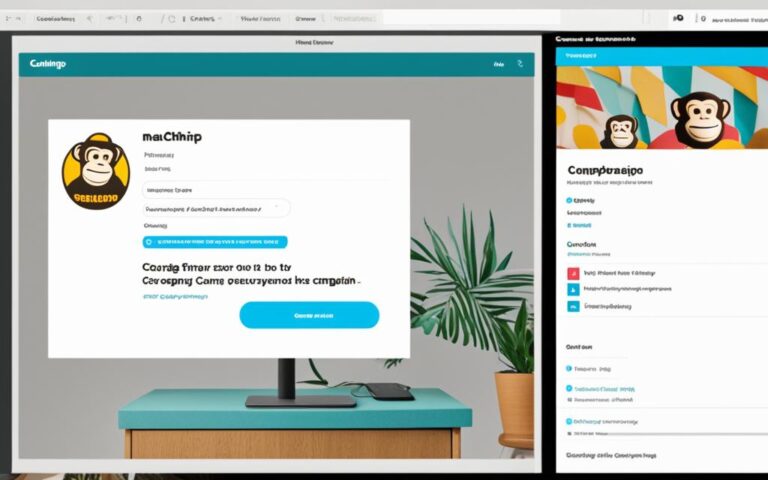Shopify vs ClickFunnels: Which Platform Is Right?
Did you know Shopify has over 200 customizable store templates? ClickFunnels, on the other hand, offers just 8. This shows how different these two e-commerce platforms are. Knowing the features of Shopify vs ClickFunnels is key to growing your online sales. We’ll look at their features, prices, and what makes them special to help you pick the right one for your business.
With more people shopping online, it’s important to understand these website builders. Shopify has been around since 2006 and is great for businesses needing a full online store solution. ClickFunnels, started in 2014, is all about making sales funnels that work. Knowing their differences helps you make a smart choice and set your business up for success.
Key Takeaways
- Shopify provides extensive e-commerce features suitable for various business sizes.
- ClickFunnels specializes in crafting efficient online sales funnels.
- Understanding pricing models is crucial; ClickFunnels starts at $97 per month while Shopify’s starter plan is available from $5.
- Both platforms offer unique tools, making your choice dependent on your business strategy.
- Shopify facilitates selling on multiple channels, including social media and in-person, enhancing reach.
- ClickFunnels includes marketing automation capabilities to streamline sales processes.
Introduction to E-commerce Platforms
E-commerce platforms are key for retailers wanting to boost their online sales. They handle important tasks like managing sales, keeping track of stock, and helping customers, all in one place. With tools like Shopify and ClickFunnels, setting up an online store is easy, avoiding the tech hurdles of selling online. Shopify, for example, has over 12 free and 173 paid themes, helping businesses make their online look great1.
User-friendly ecommerce platforms are vital. Shopify has a huge app store with over 8,000 plugins, making stores work better. This means easy payment solutions like Shopify Payments can be added right into the platform1. Shopify and ClickFunnels also meet the needs of different retailers with features that fit their sales plans. ClickFunnels is great for businesses focusing on getting leads and marketing2.
Shopify is top-notch for managing stock and tracking customers, helping retailers improve their sales. It connects with sales channels like social media and big marketplaces2. For both new and big businesses, these website builders help manage online sales well and keep up with market changes. Knowing what these platforms offer and picking the right one can greatly affect a business’s success3.
Understanding ClickFunnels
ClickFunnels is a platform made for creating effective online sales funnels. It helps businesses improve lead generation and increase conversion rates. With ClickFunnels, companies can design sales processes that smoothly take potential customers from the first touch to the final buy.
The platform offers a variety of funnel templates to help optimize marketing strategies. This makes it a sophisticated tool for both digital and physical product sellers.
ClickFunnels has a lot of features, but it starts at $97 per month. This is more than Shopify’s Starter plan at just $5 per month4. While ClickFunnels has special tools for sales funnels, it only has eight templates. Shopify, on the other hand, has over 200 templates4. This might be a drawback for users wanting more design choices.
Integrations are key for online sales platforms. ClickFunnels has about 20 apps for third-party connections. This is fewer than Shopify’s huge app store with over 13,000 apps4. This shows Shopify’s ability to connect with many tools and services for a smooth online selling experience.
Even with its limits, ClickFunnels has strong points like a built-in CRM and automation. It’s a great choice for businesses focusing on sales funnel efficiency. It suits entrepreneurs who want streamlined sales processes without needing many third-party tools. The 14-day free trial lets users see its features before paying, showing its potential for lead generation and sales4.
Key Features of ClickFunnels
ClickFunnels is known for its powerful clickfunnels features. These features help increase online sales and make customers happier. It offers over 20 funnel templates for different business needs, like lead and unboxing funnels4. These templates make selling easier and help improve how often customers buy.
ClickFunnels is great at marketing automation. It lets users send emails easily to talk to potential customers. Plus, it has A/B testing, so users can try out different content to get better results5.

ClickFunnels has tools to track how well funnels are doing. These tools show where to make things better and which marketing parts need work. Users can also add upsells and order bumps easily, making ClickFunnels a full package for businesses wanting to boost sales4. Plus, there’s a 14-day free trial, just like Shopify’s, to try it out without risk5.
In summary, ClickFunnels is easy to use and has everything marketers need. It works with many products and makes customers more engaged with professional sales pages and thank-you pages4. This makes ClickFunnels a top choice for businesses looking to make their sales funnels better.
Understanding Shopify
Shopify is a great choice for those new to e-commerce. It’s easy to use and helps businesses set up and manage their online stores with ease. You don’t need to know a lot about tech to make a site that looks good.
Shopify has over 200 customizable templates for your online store. This means you can make a site that really shows off your brand. ClickFunnels only has eight templates, showing how versatile Shopify is for e-commerce4. Shopify also has an app store with over 13,000 apps, way more than ClickFunnels’ 20 apps. This means you can easily add tools like payment gateways and inventory systems5.
For dropshipping and print-on-demand businesses, Shopify makes working with suppliers easy. ClickFunnels doesn’t offer this. Shopify’s prices start at just $5 a month, making it a budget-friendly choice. It’s also a smart pick because its Basic plan is cheaper than ClickFunnels’ starting plan4. Shopify is perfect for those who want a strong online store without spending a lot.
Key Features of Shopify
Shopify shines with its wide range of shopify features for different e-commerce needs. It has a user-friendly interface that makes managing online stores easy. It also offers strong product management tools. Users get to enjoy advanced shipping options, smooth payment processing, and various ecommerce tools to improve the shopping experience. Shopify helps businesses create engaging online experiences that boost sales and keep customers coming back.
The platform’s app ecosystem lets users easily connect with third-party services. This boosts functionality and helps businesses grow in the digital world in an evolving digital landscape. With three pricing plans, Shopify fits different budgets and growth levels6. This makes it a top choice for both new and established retailers.
Shopify focuses on managing inventories and selling through social media. It helps merchants manage their products on various platforms easily, keeping track of stock and sales6. With tools like SEO optimization and discounts, Shopify stands out in the market. Its easy-to-use design and ability to grow makes it great for businesses looking to expand online and increase sales.
Shopify vs ClickFunnels: Key Differences
Choosing between Shopify and ClickFunnels is a big decision for online entrepreneurs. Each platform has its own strengths. They cater to different business needs, especially in sales funnels and managing products.
Sales Funnel Capabilities
ClickFunnels is great for creating targeted marketing funnels. It helps businesses improve lead conversion. This ClickFunnels advantage is key for those focusing on online marketing and customer journeys.
Shopify, on the other hand, is all about giving customers a wide online shopping experience. It shows products and manages big inventories. But, it leaves lead generation to apps and integrations outside the platform. ClickFunnels is made for driving conversions, while Shopify is better at showing and managing products. Each platform suits different business strategies.
Product Management and Inventory
Shopify has strong tools for managing products, perfect for businesses with lots of items. You can easily keep track of products, inventory, and variants like sizes and colors. This makes Shopify great for developers focused on products.
ClickFunnels is okay for a few products but struggles with big inventories. If you need detailed product management, Shopify is better. It offers more than ClickFunnels in this area.

Both Shopify and ClickFunnels have big benefits. But, the choice depends on what your business values more: optimizing sales funnels or managing products well. Knowing what each platform offers helps make the right choice for your business.
For more on making smart marketing choices, check out marketing analytics tools. They can improve your business strategies and boost campaign results782.
Comparison of Pricing Plans
Looking at clickfunnels pricing and shopify pricing, we see big differences in their subscription plans and costs. ClickFunnels is for businesses wanting to boost their sales funnels. Shopify is for those who need a full e-commerce setup.
ClickFunnels Pricing Overview
ClickFunnels has a premium pricing model. The Basic plan starts at $127 a month if paid yearly. The Pro plan is $197 monthly or $157 yearly. The top-tier Funnel Hacker plan is $497 monthly or $208 yearly.
There’s also a 14-day free trial to try out features like funnel management and email automation. But, be aware, costs can go up with more features and users. It’s smart to compare costs based on what you really need78.
Shopify Pricing Overview
Shopify is more budget-friendly, starting at $29 a month yearly for the Basic plan, with a three-day free trial. Prices go up to $79 for the Shopify plan and $299 for the Advanced plan yearly. Shopify offers different tiers to fit your business needs, keeping costs lower.
Adding apps and integrations can increase costs, but Shopify is still a good choice for starting an online store affordably789.
Marketing Automation and Lead Nurturing
Marketing automation is key for boosting sales and building strong customer ties in today’s digital world. ClickFunnels excels in sales and marketing automation, offering tools to improve lead nurturing. It has automated email follow-ups and insights into funnel performance, helping users track and boost their marketing efforts1011. Shopify works well with bulk email services, helping businesses keep customers engaged through email marketing at all stages of the buying process.
Shopify’s SEO tools also help make products easier to find, which boosts lead generation11. ClickFunnels lets users make sales funnels that guide customers to buy, with A/B testing to find the best landing pages1211. Shopify’s mobile app makes managing a business easier, helping with lead nurturing by letting quick responses to sales trends and customer questions on the go.
Using both platforms, businesses can fine-tune their marketing, combining ClickFunnels for lead management and Shopify for ongoing customer engagement after a sale. These tools create a strong marketing automation system that can drive eCommerce success.
Conclusion
In the Shopify vs ClickFunnels debate, the best platform depends on your business goals. If you want to build a strong online store with lots of products and easy payment options, Shopify is the better choice. It has unlimited products and a big app store for help, making it easy to manage your store1314.
If you’re focusing on making sales funnels to boost customer conversions, ClickFunnels is the way to go. It’s great for testing different funnels and designing them to get more sales1315. Knowing these differences helps businesses pick the right tool for their online goals, which can lead to more profits.
Choosing between Shopify and ClickFunnels means understanding your business and its goals. Both platforms have their own strengths, showing that picking the right one is key to success online14.
FAQ
What are the primary differences between Shopify and ClickFunnels?
Shopify is all about managing online stores and handling products. ClickFunnels focuses on making sales funnels to boost lead generation and conversions.
Which platform is better for beginners in e-commerce?
For beginners, Shopify is easier to use. It has a simple setup and is made for e-commerce. This lets users start online stores quickly, even without a lot of tech knowledge.
How do the pricing models of Shopify and ClickFunnels compare?
Shopify starts at /month and is good for startups. ClickFunnels costs 7/month but offers advanced sales funnel tools. Businesses should think about their needs before choosing.
Can ClickFunnels help with email marketing?
Yes, ClickFunnels helps with email marketing. It lets users automate customer outreach and improve marketing campaigns through funnel optimization.
Is it possible to use Shopify for sales funnels?
Shopify doesn’t have the same level of sales funnel tools as ClickFunnels. But, it does offer upsell and cross-sell options during checkout to help with funnels.
What features does ClickFunnels offer for optimizing conversion rates?
ClickFunnels has tools like A/B testing, funnel templates, and strong analytics. These help improve lead conversion rates and customer experience.
How does Shopify support product management?
Shopify has great product management tools. It helps with tracking inventory, managing product catalogs, and creating various product variants. It’s perfect for businesses with lots of products.
Which platform is more suitable for larger e-commerce operations?
Shopify is best for big e-commerce businesses. It has lots of product management features and can grow with your business. It doesn’t have big limits.
Can I integrate third-party apps with Shopify?
Yes, Shopify has a big app store. This lets you easily add third-party services. It makes your e-commerce site more functional and helps with your business needs.
What type of businesses benefit most from ClickFunnels?
ClickFunnels is great for businesses focused on digital marketing and lead generation. It’s perfect for those selling digital products, courses, or services that need advanced sales strategies.
Source Links
- https://boostifythemes.com/clickfunnels-vs-shopify/
- https://changecreator.com/clickfunnels-vs-shopify/
- https://magenest.com/en/clickfunnels-vs-shopify/
- https://www.linkedin.com/pulse/clickfunnels-vs-shopify-which-better-selling-online-style-factory-9pixe
- https://desku.io/compare/clickfunnels-vs-shopify/
- https://www.hulkapps.com/blogs/shopify-hub/shopify-vs-clickfunnels-the-definitive-e-commerce-battle
- https://www.forbes.com/advisor/business/software/clickfunnels-vs-shopify/
- https://passionates.com/clickfunnels-vs-shopify-an-unbiased-comparison/
- https://www.channelwill.com/blogs/clickfunnels-vs-shopify/
- https://www.joinsecret.com/compare/clickfunnels-vs-shopify
- https://www.byteout.com/blog/ecommerce/clickfunnels-vs-shopify/
- https://www.linkedin.com/pulse/clickfunnels-vs-shopify-whos-winner-cretu-cosmin-andrei-qndyf
- https://www.cleverence.com/articles/shopify/shopify-vs-clickfunnels-comparing-e-commerce-platforms/
- https://www.clickguard.com/blog/shopify-vs-clickfunnels/
- https://www.updimes.com/clickfunnels-vs-shopify/







